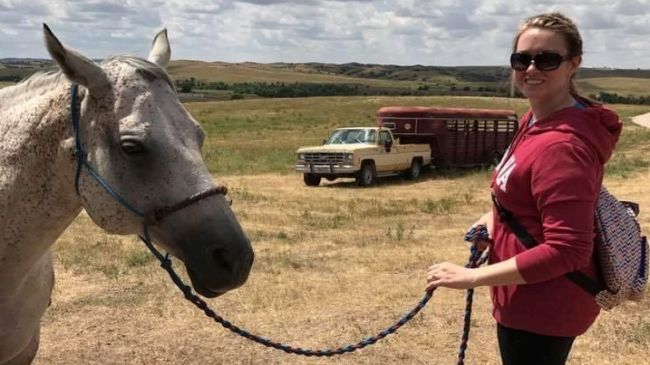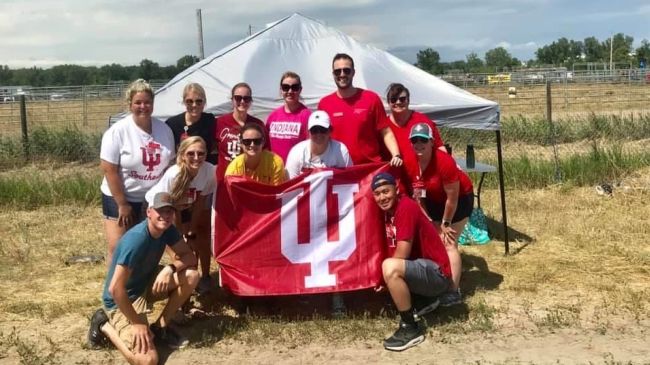
By Steven Krolak
(NEW ALBANY, Ind.)–Suzie Curts ’18 is literally living her dream.
The standout nursing graduate is an outpatient clinic nurse in the Kyle Health Center on the Pine Ridge Reservation in Kyle, South Dakota.
That dream was hatched during her junior and senior years in the IU Southeast School of Nursing, when she traveled to Pine Ridge as a member of a community health class taught by Julia Mattingly.
She fell in love with the land, community health, and the Lakota people, and vowed to return to practice her profession.
But making her dream come true has taken patience, persistence and a sense of adventure
Leaving the comfort zone
Curts applied to Indian Health Services upon graduation – unsuccessfully. Most likely she lacked the necessary experience, she now believes.
Instead, she joined a medical surgery (“med surg”) team at Baptist Health Floyd, a hospital in New Albany, Indiana.
Here she worked 12-hour night shifts, caring for half a dozen patients in an 80-bed facility, with intermittent admissions and discharges, all monitored by the latest in telemetry, with very few immunizations or other interventions. And she learned.
“Our unit had a great team, with several nurses that I would identify as mentors to me as a new graduate,” Curts said.
After a year on the med-surg team, Curts applied again for a position at IHS, and this time, she received an immediate response, and shortly thereafter, an offer.
“I probably shouldn’t admit this, but I’m pretty sure I called Dr. Mattingly before I called my mom,” Curts said.
Her elation was tinged of apprehension at the scope of the change that awaited.
“I was concurrently excited and scared,” Curts said. “By accepting a new job in a new state, I wasn’t just excited for the new challenge and the new opportunity, I was also scared to leave my comfort zone.”
Learning curves
Curts’ new life on the reservation is about as different from the big-city med-surg as you can get.
Persistent poverty is a challenge here, as is isolation.
The town of Kyle has fewer than 1,000 inhabitants, and the closest chain grocers and shopping malls are 90 miles away in Rapid City. Curts lives together with her two Jack Russell terriers and her colleagues in government quarters behind the clinic. Ironically, her nearest medical care is over an hour away, as she is not a member of the tribe.
Curts is an outpatient nurse, so doesn’t have as much extended contact with patients as she did in Louisville.
She works four ten-hour shifts, with weekends and federal holidays off. Beginning at 7:30 each shift, she checks equipment such as the immediate care cart, defibrillator and glucometer. She reviews the day’s schedule, which may include lab tests, vaccinations and nursing procedures. And she prepares to assists with screening patients: measuring vital signs, completing medication reconciliations, and documenting health habits, such as tobacco and alcohol abuse.
“We live in a rural community and our clinics do not have an emergency center or urgent care,” Curts said. “My role is to triage those that call or walk in, and determine an appropriate plan of care based on the seriousness of their condition.”
She performs well check-ups, manages for chronic or acute illness, and assists doctors as needed. She gives adult and child immunizations, administers medications via injection, inhalation, or orally, cares for wounds, inserts IVs, places or removes catheters, runs EKGs.
“Most importantly, I do a lot of patient education on health promotion, disease management and prevention, and illness treatment,” Curts said.
Her learning curve has been steep. Outpatient documentation is different from inpatient, and she has had to quickly become proficient in an electronic health record system that is different from others she had used. She is grateful for the support she has received from her teammates, which has made it possible for her to complete more orientations and earn certifications for advanced cardiac life support and pediatric advanced life support.
“Overall, it has been a lot of training in a short period of time, but nursing is a field of constant change, and I’ve always viewed stating education and informed as an investment in my own growth as a nurse,” Curts said.
Her ability to respond to needs both big and small is critical to her success and to the health of her patients in one of the most difficult environments in America.
“In nursing school we’re taught social and physical determinants of health, which are conditions in a person’s environment that affect health status and overall health outcomes and risk,” Curts said. “As a nurse, I understand the reality of life on the reservation and the hardships the Lakota people face each day, and how it may impact the health of the people I serve.”
Those determinants of health include factors such as the natural environment, accessibility of food, water and health care, transportation, exposure to crime, literacy, culture, and socioeconomic conditions.
“Pine Ridge is very remote, which can make it challenging to provide adequate housing, employment opportunities, and access to fresh, healthy foods,” Curts said. “Living within what is known as a food desert, where access to healthy food is a challenge, places those in the community at risk for conditions such as obesity, diabetes and heart disease.”

Amid these difficult circumstances, she is consistently overwhelmed by the resiliency and generosity of the community.
“It’s one thing to read about statistics, and another thing entirely to see them,” Curts said. “Some people walk many miles to be seen at the clinic, and walk even further to get their groceries, yet despite their own concerns, the people I’ve met have been so kind and open to share their culture.”
Challenges and rewards
Pine Ridge may seem far afield, but it is also touched by the global coronavirus pandemic, both directly and indirectly.
While there have been many positive cases in surrounding counties, Curts notes, both IHS and the Oglala Sioux Tribe have proactively promoted and implemented shelter-in-place and curfew orders, as well as border checkpoints, to contain the spread of the virus.
Curts notes that clinic volume is down, suggesting that people on the reservation are doing a good job of social distancing. This is supported by the expansion of telehealth by IHS.
“This has been crucial in not only increasing communication with many of our high-risk patients, but also decreases the risk of further virus spread, as people can receive medical care from the safety of their homes.”
There are still many challenges: Extended families often live together, and many do not have indoor plumbing, inhibiting hygiene.
In addition, shopping is difficult—it has not been uncommon for her or community members to drive the 90 miles to Rapid City for food and supplies, only to find the shelves empty.
With her typical can-do spirit, Curts is now planning to use her stay-at-home time to create a food garden, applying what she has learned from classes offered by the local college.
Living transformed
Curts credits IU Southeast with having taught her a great deal about the real world of nursing. Stimulating clinicals reinforced technical nursing skills and procedures, and acquainted her with a range of patients and situations, as well as with the life-skills that she has come to appreciate as critical—such the ability to prioritize and manage stress.
“Overall, the nursing program at IU Southeast not only gave me a solid foundation of nursing knowledge and skills, but helped me to discover an area of nursing that I am passionate about,” Curts said.
That passion was fed by faculty role models such as Mattingly and Kathleen Free, who taught the importance of compassion and opened her eyes to the world of public health.
“From the very first time that I went to Pine Ridge as a junior in 2017, I felt instantly drawn in,” Curts said. “And when I returned as a senior in 2018, I felt even more strongly about working to improve the health of the tribe.”
That connection to the people is strong. She loves the Lakota way of listening and sharing knowledge, the generosity in helping her understand the culture, including traditional beliefs toward health and illness, including Lakota health practices. For Curts, being able to participate in these conversations with sensitivity and understanding is an essential part of her job.
“Ultimately the more I learn about their traditional ways of living and the unique adversities they face as a community, the better I am prepared to serve the community in a culturally competent way,” Curts said.
Part of that learning involves embracing the rich simplicity of rural living.
“What Kyle lacks in amenities, it makes up for in culture and new experiences,” Curts said.
She loves the local coffee shop, housed in a converted shipping container, that sells amazing cookies and frappes. She revels in the outdoor life, hiking in the nearby Badlands National Park and Black Hills National Forest. And she enjoys the company not only of her own two terriers, but of numerous “rez dogs,” horses and cows, knowing that every day may also bring a chance magical encounter with eagles, bison, antelope, porcupines and prairie dogs.
“It’s truly an animal wonderland,” Curts said.
For Curts, Pine Ridge is one more chapter in the journey of transformation that nursing has become.
From a telemetry-monitored med-surg unit to a remote rural clinic, she continues to find ways to apply the core values of compassionate care, and encourages others to follow their hearts as they seek a context that nourishes their sense of purpose.
“There is a great need for passionate healthcare providers in rural communities such as the Pine Ridge Indian Reservation,” Curts said. “And completing said clinical might open you up to a unique, enriching and rewarding career in nursing.”


